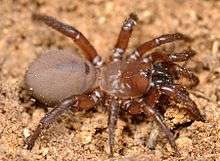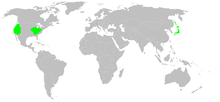Antrodiaetidae
Antrodiaetidae, also known as folding trapdoor spiders, is a small spider family related to atypical tarantulas. They are found almost exclusively in the western and midwestern United States, from California to Washington and east to the Appalachian mountains.[1] Exceptions include Antrodiaetus roretzi and Antrodiaetus yesoensis, which are endemic to Japan and are considered relict species. It is likely that two separate vicariance events led to the evolution of these two species.[2]
| Folding trapdoor spiders | |
|---|---|
 | |
| Antrodiaetus unicolor, female | |
| Scientific classification | |
| Kingdom: | Animalia |
| Phylum: | Arthropoda |
| Subphylum: | Chelicerata |
| Class: | Arachnida |
| Order: | Araneae |
| Infraorder: | Mygalomorphae |
| Clade: | Atypoidea |
| Family: | Antrodiaetidae Gertsch, 1940 |
| Genera | |
| Diversity | |
| 2 genera, 35 species | |
 | |
Genera
As of July 2020, the World Spider Catalog accepted the following genera:[1]
- Aliatypus Smith, 1908 — United States
- Antrodiaetus Ausserer, 1871 — United States, Japan
- Atypoides O. Pickard-Cambridge, 1883 — United States
- Hexura Simon, 1884 — United States
See also
References
- "Family: Antrodiaetidae Gertsch, 1940". World Spider Catalog. Natural History Museum Bern. Retrieved 2020-07-24.
- Miller, J.A; Coyle, F.A. (1996). "Cladistic analysis of the Atypoides plus Antrodiaetus lineage of mygalomorph spiders (Araneae, Antrodiaetidae)" (PDF). Journal of Arachnology. 24 (3): 201–213.
- Hendrixson, B.E. & Bond, J.E. (2005). Two sympatric species of Antrodiaetus from southwestern North Carolina (Araneae, Mygalomorphae, Antrodiaetidae). Zootaxa 872:1-19. PDF (A. unicolor, A. microunicolor)
External links
| Wikispecies has information related to Antrodiaetidae |
| Wikimedia Commons has media related to Antrodiaetidae. |
This article is issued from Wikipedia. The text is licensed under Creative Commons - Attribution - Sharealike. Additional terms may apply for the media files.